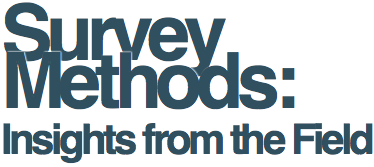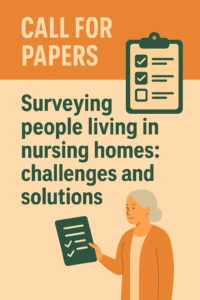Special Issue: Advancements in Online and Mobile Survey Methods
The goal of this special issue is to contribute to knowledge about the current state of online and mobile survey methods, focusing on the components of the Total Survey Error framework for cross-sectional and panel surveys as well as augmenting survey data with other data types. The issue includes eight papers that cover different aspects of recent technological advancements that drive innovation and enable new measurement capabilities that potentially allow new and deeper insights into human interactions, attitudes, and behaviors.
Using Facebook and Instagram to Recruit Web Survey Participants: A Step-by-Step Guide and ApplicationSpecial issue
In many countries and contexts, survey researchers are facing decreasing response rates and increasing survey costs. Data collection is even more complex and expensive when rare or hard-to-reach populations are to be sampled and surveyed. In such cases alternative sampling and recruiting approaches are usually needed, including non-probability and online convenience sampling. A rather novel [...]
Facebook, Instagram, non-probability samples, Nonresponse, rare populations, social media, Social media survey,
Comparison of Quarterly and Yearly Calibration Data for Propensity Score Adjusted Web Survey EstimatesSpecial issue
While web surveys have become increasingly popular as a method of data collection, there is concern that estimates obtained from web surveys may not reflect the target population of interest. Web survey estimates can be calibrated to existing national surveys using a propensity score adjustment, although requirements for the size and collection timeline of the [...]
calibration, health survey, National Health Interview Survey, propensity score models, Research and Development Survey, web survey,
Text Message (SMS) Pre-notifications, Invitations and Reminders for Web SurveysSpecial issue
This paper presents the findings derived from a mobile friendly web survey, during which all invitations and reminders were sent as text messages via short message service (SMS) to the mobile telephones of the target group. The web survey under study was conducted for the National Theatre of Northern Greece (NTNG), the largest theatrical organization [...]
mobile surveys, pre-notifications, response rate, short message service (SMS), text message, Web surveys,
Device effects on survey response quality. A comparison of smartphone, tablet and PC responses on a cross sectional probability sampleSpecial issue
The increasing use of web surveys and different devices for survey completion calls for the examination of device effects on survey response quality. Whereas most existing studies are based on web panels, subgroups (e.g., students), or short questionnaires designed for device experiments, which compels participants to respond through specific devices, this study is based on [...]
Page switching in mixed-device web surveys: prevalence and data qualitySpecial issue
As a self-administered survey mode, web surveys allow respondents to temporarily leave the survey page and switch to another web page in a different browser tab or to another window/app. This form of sequential multitasking has the potential to disrupt the response process and reduce data quality if respondents become distracted (Krosnick, 1991; Sendelbah et [...]
data quality, mixed-device, mobile web surveys, multitasking, paradata,
Collecting and using always-on location data in surveysSpecial issue
As survey costs increase and response rates decrease, researchers are looking for alternative methods to collect data from study subjects. Passively collected data may offer a way to reduce the burden on research subjects while also collecting high-quality data needed for social science research. Examples of passive data collection tools are applications installed on mobile [...]
location data, mobile surveys, passive data collection, survey data, tools,
Using Geofences to Collect Survey Data: Lessons Learned From the IAB-SMART StudySpecial issue
Within the survey context, a geofence can be defined as a geographical area that triggers a survey invitation when an individual enters the area, dwells in the area for a defined amount of time or exits the area. Geofences may be used to administer context-specific surveys, such as an evaluation survey of a shopping experience [...]
analysing data, geofence, IAB-SMART, limitations, triggered surveys,
Multi-mode question pretesting: Using traditional cognitive interviews and online testing as complementary methodsSpecial issue
Questionnaire development, evaluation, and pretesting research is critical for ensuring that survey questions, materials, and data collection procedures produce the highest quality data possible. Interviewer-administered cognitive interviews is a common pretesting method used to collect rich, qualitative data. As technology has advanced, researchers can conduct similar research online in self-administered modes (Behr 2016), allowing for [...]
cognitive interviewing, item nonresponse, multi-method studies, survey methods, survey pretesting, web pretesting,






